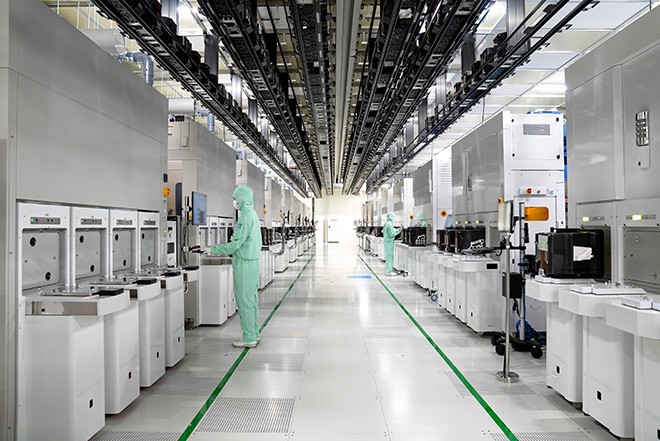THE ASAHI SHIMBUN
May 16, 2022 at 17:37 JST
 A clean room in Kioxia Holdings Corp.’s semiconductor factory in Kitakami, Iwate Prefecture (Provided by Kioxia Holdings Corp.)
A clean room in Kioxia Holdings Corp.’s semiconductor factory in Kitakami, Iwate Prefecture (Provided by Kioxia Holdings Corp.)
With the help of government grants, companies around Japan are spending trillions of yen to construct or upgrade their semiconductor factories to heighten production amid the global chip shortage.
It is rare for the government to use taxpayers’ money to help build factories, but Japan plans to revive its semiconductor sector to its past levels of glory.
In the 1980s, Japan had around a 50-percent share of the global semiconductor market, but the figure has dropped to around 10 percent, a decline described by the industry ministry as “a failure of the government’s industry strategy.”
Chips are now in short supply around the world because their production has not kept pace with the surge in products that use them, such as smartphones, home appliances and automobiles.
To ensure a stable domestic supply, the Japanese government will pay up to half of the construction costs for semiconductor plants from its new 600-billion-yen ($4.63-billion) fund.
Major semiconductor manufacturer Kioxia Holdings Corp. plans to add a building with a floor space of 31,000 square meters to its Kitakami factory in Kitakami, Iwate Prefecture.
An estimated 1 trillion yen will be spent to construct the new building, which will produce NAND flash memory, a semiconductor to store data, for use in smartphones.
The building is scheduled to be completed next spring.
Kioxia Holdings in April added a building to its Yokkaichi factory in Yokkaichi, Mie Prefecture, one of the world’s largest flash memory production facilities.
That new building, which also cost around 1 trillion yen, will start operating this fall.
Toshiba Corp. owns around 40 percent of Kioxia Holdings’ shares.
The chipmaker is expected to jointly pay for the costs of the two new buildings with U.S. semiconductor manufacturer Western Digital Corp.
However, Kioxia’s president, Nobuo Hayasaka, expressed hopes that the Kitakami factory upgrade will benefit from the government’s new fund, which was set up to support the semiconductor industry.
In Kumamoto Prefecture, Taiwan Semiconductor Manufacturing Co., Sony Group Corp. and major autoparts manufacturer Denso Corp. will build a factory to produce data-processing “logic semiconductors.”
TSMC is the world’s largest contract manufacturer of semiconductors.
The cost to build the factory will again be 1 trillion yen, and it will start operating in 2024.
The factory is expected to receive around 400 billion yen from the fund as its first beneficiary.
The grant will be provided on the condition that the factory will operate for more than 10 years.
Toshiba, Mitsubishi Electric Corp. and other companies will enhance their capability to manufacture “power semiconductors,” which contribute to saving energy.
Apart from the 600-billion-yen fund, the government has set aside 47 billion yen to support production of components exclusively for particular products, including microcontrollers and power semiconductors.
The government by March 30 had chosen 30 projects that will receive 46.5 billion yen from the 47-billion-yen budget, including the factory plans of Toshiba and Mitsubishi Electric.
But the government hasn’t disclosed how much each of these companies will receive.
On May 11, the Diet passed an economic security bill. Under the new law, the government will designate certain goods as critical items for support. Semiconductors are expected to be included on the list.
Western countries and China are rushing to support their countries’ semiconductor sectors, while Japan aims to establish a domestic supply chain for chips.
However, experts say lopsided government support for certain companies could interfere with free competition.
(This article was written by Shimpei Doi, Kenji Izawa and Susumu Imaizumi.)




















A peek through the music industry’s curtain at the producers who harnessed social media to help their idols go global.
A series based on diplomatic documents declassified by Japan’s Foreign Ministry
Here is a collection of first-hand accounts by “hibakusha” atomic bomb survivors.
Cooking experts, chefs and others involved in the field of food introduce their special recipes intertwined with their paths in life.
A series about Japanese-Americans and their memories of World War II